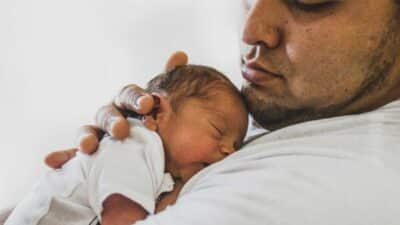Family planning and transgender
Transgender and pregnancy
In recent years, the topic of transgender has increasingly come into the spotlight media. At the same time, medicine has made great advances, which in turn should certainly be of interest to the worldwide trans scene. Even if we initially and traditionally tend to associate pregnancy and birth with stations in a woman’s life, a broadening of the perspective is called for here.
Trans men with beards and round pregnancy bellies — this sight may be new and unusual for some. However, since the Briton Freddie McConnell made his pregnancy public in the cinematic documentary “Seahorse”, the subject of parenthood has been allowed to open up to new possibilities.
The term “transman” and “transwoman”
Basically, we speak of “transgender people” when a person does not identify with the gender that was registered at birth. Transgender people can, for example, be born with a uterus and ovaries but feel they belong to the male gender. They may take hormones and/or have gender-modifying surgery to approximate the male gender. So-called transmen can, but do not have to, have a uterus and ovaries.
Transwomen are those who identify as women even though they were assigned the male sex at birth. In addition, there are a variety of transgender people, such as non-binary people or people with a fluid gender.
Trans people and the desire to have children
There are no reliable figures yet on how many transgender people carry out pregnancies. A study from Belgium in 2020 called “Desire to become parents and fertility preservation among transgender people living in Belgium who were classified as female at birth” showed that: 39% of the people surveyed had the desire to become parents. What keeps them from doing so? Apart from fears such as the fear of discrimination against the child, assumed expense and difficulties in adoption procedures, the legal situation alone looks complex. For in many countries, legal gender reassignment often goes hand in hand with forced sterilisation. This is the case in 24 countries in Europe alone, for example in Belgium, Italy, Switzerland or France.
The legal situation in Germany
In 2011, the Federal Constitutional Court ruled that the forced sterilisation of transgender people was not conform with fundamental rights. Beforehand, anyone who had decided to change their first name and marital status had had to renounce the right to parenthood. Since 2011, Germany has therefore experienced a growing number of life plans that also include the desire to have children and become parents.
For transgender people who wish to have children, there are a few things to consider. For example, in its official brochure „Trans* Health Guide“ under the heading „Desire to have children“, the Trans* Federal Association states that the desire to have children and being trans* are not mutually exclusive. However:
“Since some body-modifying treatments limit the ability to reproduce, a possible desire to have children should be discussed in the preparation. Perhaps sperm preservation or the preservation of reproductive organs is wished. In addition, information should be given about the possibilities of foster care and adoption.”

Transmen and the desire to have children
In German-speaking countries, there has been no research on the topic of trans pregnancy so far. However, there have been frequent reports about pregnancies of transmen. Nevertheless, the misinformation persists that biologically female people may become incapable of concieving once testosterone is consumed. What is important here in the first place is whether or not the uterus and ovaries have been surgically removed in the course of a desired masculinisation. For as long as the uterus and ovaries remain, the possibility of fertility is guaranteed. This is also the case if hormone preparations based on testosterone are taken.
Transgender and artificial insemination
One of the first studies dedicated to the topic of artificial insemination in female-male transgender patients came to a positive conclusion. The study compared, the egg yield with that of cis patients (people who were registered with the female sex at birth and who also identify with this sex). According to the study, artificial insemination methods can achieve excellent results.
Transwomen and the desire to have children
An intact uterus and functioning ovaries are necessary for pregnancy. But does this have to be unalterably present in a woman? Medicine is now able to transplant wombs. Theoretically, a trans woman could not only be a “father”, but also a mother of her own baby. Even if it is a long way to go, the first steps have already been taken. Back in 2013, the Swedish gynaecologist Mats Brännström transplanted a woman’s uterus from a donor for the first time. A dozen children have already been born after a uterus transplant so far.
Transgender and Social Freezing
For people born with a uterus the possibility of so-called cryopreservation is interesting. Here, egg or sperm cells are deep-frozen using liquid nitrogen and reused for fertilisation at a later date.
The Federal Ministry for Family Affairs, Senior Citizens, Women and Youth (BMFSFJ) advises on its information pages of the rainbow portal to always consider the optimal time for preserving one’s own germ cells before any planned physical gender reassignment. Endocrinologists are the first point of contact here.
Für Menschen mit einer angeborenen Gebärmutter dagegen ist die Möglichkeit der sogenannten Kryokonservierung interessant. Hier werden Ei- oder Samenzellen mittels flüssigem Stickstoff tiefgefroren und zu einem späteren Zeitpunkt für die Befruchtung wiederverwendet.
Das Bundesministerium für Familie, Senioren, Frauen und Jugend (BMFSFJ) rät auf seinen Infoseiten des Regenbogenportals dazu, vor jeder geplanten körperlichen Geschlechtsangleichung in jedem Fall den optimalen Zeitpunkt der Konservierung eigener Keimzellen mitzudenken. Hier sind vor allem Endokrinologinnen und Endokrinologen die ersten Ansprechpersonen.
Hope for medical progress
In the long term, it may be possible at some point to completely decouple reproduction from biological sex. A Japanese researcher is already working on turning body cells into stem cells in order to grow germ cells (i.e. sperm and eggs). He has already been successful in experiments with mice and was able to obtain embryos.
There is still a long way to go. It is hoped that the possibilities for transgender people to have their own biological children will increase with medical research. On top oft that we hope that the societal and social stigmatisation for transgender people decreases in the long run.
About Fertilly
At Fertilly, we have made it our mission to accompany couples (homosexual and heterosexual) and singles on the way to fulfilling their child wish. In doing so, it is important to us to create transparency in the area of fertility services, to provide information and knowledge on the topics of pregnancy and fertility and to help you to find the most suitable Fertility Center. Through cooperation with first-class Fertility Centres and clinics in Europe, enquiries about Fertilly are given preferential treatment. This means that our patients avoid the usually long waiting times and get appointments more quickly.
If you would like more information about Fertility Centers, success rates and prices, please contact us using this questionnaire. We will advise you free of charge and without any obligation.
-
Answer the first questions in the online form in order to book an appointment. This way we can better address your needs during the conversation.
-
We will find the best contact person for your individual needs. Schedule 20 minutes for the consultation.
-
We will introduce you to the right fertility clinic from our network, make an appointment and accompany you until your wish for a child is fulfilled.










